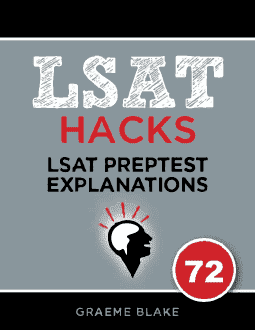QUESTION TEXT: Genuine happiness consists not in pleasurable feelings…
QUESTION TYPE: Necessary Assumption
CONCLUSION: A happy life is a virtuous life.
REASONING: Happiness is when you have a sense of approval of your character and projects.
ANALYSIS: Generally, necessary assumption questions have a gap between evidence and reasoning. They introduce a new term in the conclusion. In this case: “a morally virtuous life”. That term has no connection to the evidence. It is therefore a necessary assumption that the new term in the stimulus is related to the evidence. So this argument assumes that a morally virtuous life has something to do with approval for your projects.
Material well being is mentioned in three answers. These are traps. Material wealth has nothing to do with the argument! The author only mentioned it to clarify what the good life is. Many people think wealth is the good life, but the author says the good life is actually a moral one. This doesn’t mean wealth is bad. It just means what it says: the good life is morality. Wealth might be something to seek, but by itself it isn’t the determinant of a good life.
___________
- The argument didn’t say that material well being is bad. The author just mentioned it to make a distinction: the good life is morality, not wealth. This tells us what the good life is, but it doesn’t necessarily mean wealth is bad.
- CORRECT. The negation of this destroys the argument. The argument said happiness depends on approving of your character. If morality has nothing to do with that then there’s no evidence linking morality to happiness.
Negation: A morally virtuous life tends to have nothing to do with approving of your own character and projects. - This is irrelevant. The argument was talking about happiness, not pleasure.
- Material well being isn’t relevant. It was just mentioned to make a distinction: the good life means morality, not wealth.
- Material well being doesn’t matter. It was just mentioned to clarify that the good life is actually morality.


Leave a Reply